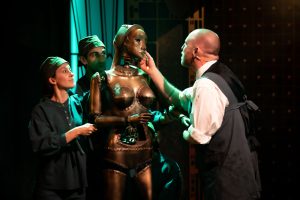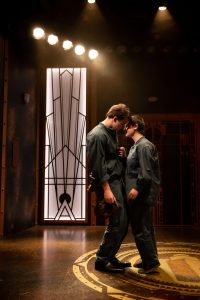Hayes Theatre, April 26
7.5/10
Before a note is sung you’re seduced by Nick Fry’s set. The angular art deco shapes ornamenting upstage windows are echoed in downstage panels depicting skyscrapers. This elegance contrasts with the brutalist world between them: one of metallic walls and beefy rivets, of grills, switches and steel railings. This is the world of the workers in Metropolis, while the former is the realm of their despotic boss, Joh Fredersen.
A year after Thea von Harbou published her 1925 novel, Metropolis, her husband Fritz Lang made it into an epic and extraordinary silent film. It depicts a dystopian future in which the workers service giant machines that keep the metropolis humming for the privileged few who live above ground. The poor workers live entirely subterranean existences – until roused into rebellion by the iron-willed Maria.

Now Julia Robertson (book, lyrics, direction and choreography) and composer/orchestrator Zara Stanton have turned all this into a musical. The improbability of that is instantly swept away by the opening, the operatic title song, which is so ferociously gripping in terms of composition and staging that you have to remind yourself to breathe. Such moments of raw brilliance stud the show throughout, and had Robertson and Stanton managed to make the work consistently of this quality, it would be among the best Australian musicals ever penned. Instead, moments of flaccid dialogue and lesser songs intrude, and dent the tension and puncture the sense of dreamlike rapture. But when it’s working, it’s irresistible, with near-perfect synergy not just between words and music, but between the choreography, performances and all the design elements, including Ryan McDonald’s striking lighting.
Stanton’s music is ambitious. Like Sondheim’s Sweeney Todd, it blurs the line between musical theatre and opera, and is blessed by some potent singers among the dozen-strong cast. Standing out is Joshua Robson as Fredersen, his voice lending his character innate authority, with Shannen Alyce Quan as Maria, Thomas Campbell as Rotwang (Fredersen’s evil-genius underling) and Tom Dawson as Freder (Fredersen’s idealistic son) among those also delivering compelling vocal performances.

Just as impressive is Stanton’s orchestration for just a trio consisting of her own keyboards plus trumpet and cello. It is a combination that allows for a surprising array of textures; that can be eerily haunting and even achieve an imposing sense of scale.
Fry’s exceptional design extends to the robot Futura, operated by three puppeteers led by Amanda McGregor. She is the creation of Rotwang, and to finish her he must copy a human face, and Maria is forced into providing this service. But somehow the drama of this goes missing, and thereafter Robertson leaves us slightly confused as to when Quan is playing the real Maria and when the robot Maria.
An interval is squeezed into the 100 minutes, during which we’re corralled into the foyer while Dominic Lui delivers a German folk song, accompanied by Stanton on accordion. It’s fun touch that broadens the show’s scope, before Act Two plunges us into the bowels of the salacious Yoshiwara nightclub, peopled with grotesques who dance to Stanton’s take on techno music.
Fans of the film should see what the creators have done with the raw material, because the best bits are exhilarating. If Robertson and Stanton can hone it further, it will certainly merit another airing. They probably hope that happens on a bigger stage, but I rather like the intensity at the Hayes: a pocket opera in a crucible lit by a blue flame.
Until May 20.